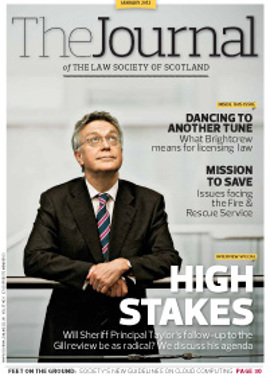Service complaint figures

Figures have begun to emerge of the level of settlements and awards in service complaints dealt with by the Scottish Legal Complaints Commission.
The Commission’s annual report for 2010-11, covering the year to 30 June 2011, takes in the first period when the Commission investigated all complaints of inadequate professional service, irrespective of when the transaction in question occurred.
It also reveals that the SLCC continued to spend less money than budgeted, with actual expenditure of £2,408,000, against a budget of £2,839,000 and income of £2,232,000, giving a deficit on the year of £175,000.
The Commission’s reserves at the year end stood at £1,816,000 (down from £2,025,000 the year before), of which £1m was earmaked to underwrite the general levy in 2011-12. During the year, the Commission received 2,598 enquiries, and 1,090 complaints to add to the 274 in hand at the start of the year. Of these, 503 complaints were ruled ineligible for investigation, 85 conduct complaints were referred to the Law Society of Scotland (81) or Faculty of Advocates (four) for investigation, 210 were dealt with and closed by the SLCC, and 566 were still in hand at the year end, including 290 awaiting a decision on eligibility.
The most common reasons for a complaint being declared ineligible were that it was frivolous, vexatious or totally without merit (160 cases), and that it was out of time (146 cases), the limit normally being one year from when the professional relationship ended. Some cases were also referred to the professional bodies under the transitional arrangements.
Resolutions
Fifty seven complaints were resolved by mediation, and one withdrawn before that stage. A further 42 were resolved by report or conciliation at the complaint investigation stage, and 22 more withdrawn. In six of those resolved there was an abatement of fees (range £200-£2,000; average £893), and in 13 a payment of compensation (range £40-£2,061; average £517).
A further 88 progressed to a formal determination, of which seven were upheld in full, 20 in part, and 61 not upheld. Awards at this stage showed the same range of fee abatements, with an average of £650, and compensation payments between £75 and £9,261 (average £979).
The Commission also reports that it dealt with 50% of complaints within 100 working days, 85% within 200, and 95% within 300. The most common categories were residential conveyancing (22%), litigation and family law (15% each), and executries, wills and trusts (12%). No other category accounted for more than 4%, the figure for crime.
Introducing the report, the chair, Jane Irvine, said it had been a year of “significant progress” for the Commission. She was keen that the SLCC should “start saying more” to encourage the profession to learn from complaints, but commented: “We have decided to be cautious about drawing conclusions from the limited information we hold; including statistics regarding numbers and types of complaints coming to us. It is not sensible to draw inferences from only two-and-a-half years of limited information about a profession as complex as the Scottish legal profession”.
She also said the Commission was continuing to “lobby the Scottish Government for changes to the Act to allow our complaint handling to become more efficient and user friendly”.
The report can be accessed via www.scottishlegalcomplaints.org.uk
- The Law Society of Scotland has objected to a passage in the report which states that there is a statistical relationship between the number and total value of the claims made on the Guarantee Fund in the same year as an individual claim, and the level of payment made in individual claims, and suggests that “the outcome of claims is influenced by factors other than the merits of the claims”. The Society says this is “wholly misleading”, as the merit of the individual claim remains the only consideration when considering the outcome of that claim and any subsequent payment from the Guarantee Fund. “This was clearly explained to the SLCC in meetings and in written correspondence from the President of the Society”, in advance of publication of the report, it says.
In this issue
- Reading for pleasure
- IP: the call of the south
- IP: home advantage
- Forcing: the issues
- Construction disputes: what of mediation?
- The key to effective trainee development
- Opinion
- Book reviews
- Council profile
- President's column
- Register reborn
- Justice at stake
- A matter of life and death
- The future is Brightcrew?
- Safe keeping
- Always something new
- Control switches
- Hard cases
- Whose law rules?
- Service complaint figures
- Scottish Solicitors' Discipline Tribunal
- Mora no more?
- Head in the cloud - feet on the ground
- Crown offers safer mail
- Law reform roundup
- CPD competition
- Don't be tempted!
- Ask Ash
- Preparing for spring






